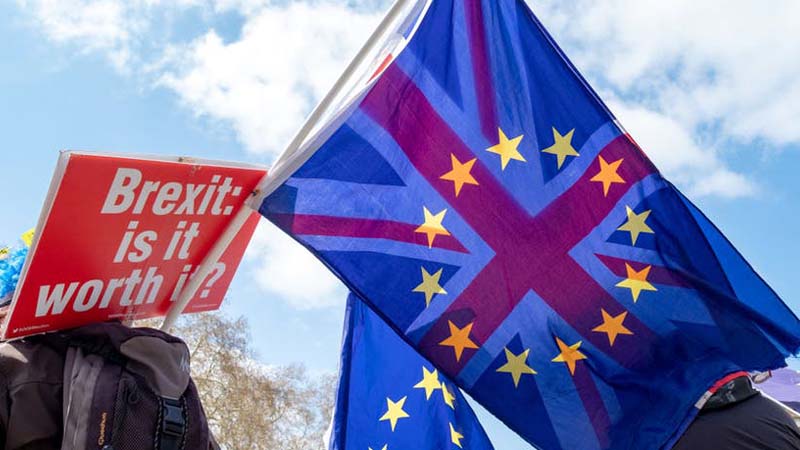Brexit leads to uncertainty for the EU

As one of the most significant political events in all of Europe concludes showing the divisive results of the European Parliament Election 2019, it is apparent that the very future of European Union (EU) has come under pressure based on the recent developments surrounding Brexit.
The political, cultural and economic consequences are being felt across the UK. Concerns over the possible fallout have spread not only to Europe but all over the world. London is one of the world’s oldest and largest financial hubs. The devaluation of pound sterling along with trade restrictions has many speculators worried. There is also growing concern over a recession hitting the economy.
The other 28 member European countries are right to fear severe repercussions due to Brexit deal fallout. The economic and political partnership, established after World War Two to prevent another such war, is now under growing pressure from many of its member nations.
The main reason for concern is of course as a result of the “single market” phenomenon created by the EU. The member states had free reign to move goods and people freely, essentially acting as one single country. If the UK is taken out of the equation, many of the states stand to lose financial and other benefits, simply due to the prominence and importance of the UK as a trade port.
However, with Britain’s exit from the EU looming in the near future, the election results from the European Parliament Election 2019 seem to reflect the growing conflict in the region. The most important issues for the member nations in recent years has been that of immigration, security, as well as growing nationalist sentiment among the general public as well as the ruling parties.
The election results are crucial in determining the future of the continent as the European Parliament has the jurisdiction to set rules in a wide range of areas from transport, consumer rights to issues on the environment as well.
The massive voter turnout indicates that majority of the people are ready for a change and that they are mostly dissatisfied with their current government. Particularly in countries like France, Germany, Italy and Poland, the voters expressed their lack of confidence in the parties in power.
The rise in nationalist sentiment was indicated in polls particularly in Italy, France and the UK. There was also an indication of increase in support for liberals and the Greens. For the first time in 40 years, the two classical parties, socialists and conservatives, will no longer have a majority. While pro-EU parties are still expected to be in majority, there has been some concern about the future of the EU, particularly due to comments
How much the European Union
and its citizens will be affected in
the long-term by Brexit is still up for
speculation. However, it did plant the
seeds of uncertainty that is for sure
The victory of the populist parties is likely to bring about many changes affecting the entire continent. The one thing binding all the varying populists is their aim to disrupt the system and make consensus on future European budgets and legislation more complicated. According to experts, the newly elected European Parliament will be messier and harder to control than ever before. How the different elements will eventually come together to make decisions on behalf of the entire continent is yet to be seen.
The results for Britain did not come particularly as a shock. Nigel Farage’s populist Brexit party won with 31.5 percent of the vote. Both Labour and Conservatives suffered humiliating defeat. The voters appear to have favored the parties which took a hard stance either in favor of Brexit or even against it. Labour and Conservatives, while trying to reach middle ground through compromise seem to have lost the favor of the majority.
After the resignation of Theresa May, her possible successor Boris Johnson is now in the spotlight particularly for his support of a “hard” or no-deal Brexit which might cause damage and disruption to the economy. However, as a result of the chaos created by Brexit, there is growing concern among other countries such as Germany about the future of the European Union.
The main sticking point for countries such as the UK wanting to leave the EU is the restriction to strike individual trade deals and the open borders. Those in favor of the “hard” exit or no-deal Brexit claim that in doing so the UK will be able to avoid the £39bn “divorce” bill, as well as being free to strike its own beneficial trade deals around the world. However, those who are in support of striking a deal claim that if the UK severs all ties with the EU with immediate effect, there will be no transition period and no guarantees on citizens' rights of residence. The government fears this would cause significant disruption to businesses in the short-term as well as shortages of essential goods.
However after May’s resignation, her successor has a limited amount of time to convince Parliament to come to a consensus with the deadline on October 31st, 2019. With Johnson and Farage now the two most likely candidates as May’s successor, it is likely that a “hard” exit will come to fruition.
How much the European Union and its citizens will be affected in the long-term by Brexit is still up for speculation. However, it did plant the seeds of uncertainty that is for sure. Whether or not more countries will follow suit and leave the EU is hard to predict at this point in time. The newly-elected European Parliament seem to have their role specified for them in the coming months as they try to bring reconciliation in an increasingly divided Europe.
Synthia Kainath Nur works with Bangladesh Post.
Read more: www.bangladeshpost.net




